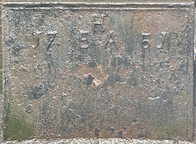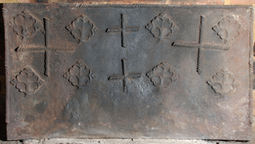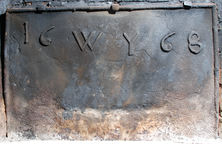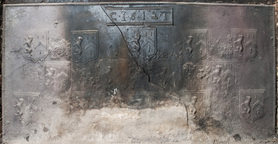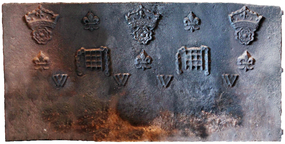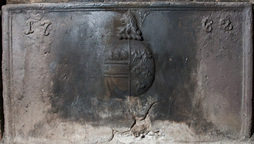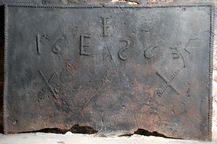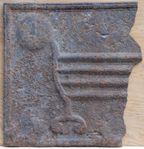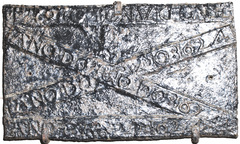-
1169
Description: Rectangular shape; cyma reversa moulded edging (top and sides); top centre, initials EHA in triad; date split each side of initials.
Notes: Well formed and well spaced letters and numbers.
Inscription: 17 EHA [triad] 51
- Decoration tags:
- rectangular (shape)
- cyma reversa/ogee (edging)
- individual letters
- individual numbers
- text
Manufactured: in 1751 in England.
Current location: not known.
- Attached to series:
- Date & initials firebacks
-
846
Description: Rectangular; twisted rope edging (top and sides); floriated trefoil stamp repeated in two rows of four in the upper two-thirds of the plate; between the middle four stamps, two small crosses of twisted rope, one above the other; between each outer group of four stamps a large cross of twisted rope.
Notes: The floriated trefoils may have been derived from a metal ornament.
- Decoration tags:
- rectangular (shape)
- rope (edging)
- simple stamps
- apotropaic
- objects
Manufactured: in the mid- to late-16th century in the Weald area of England.
Current location: in private hands, Barcombe, East Sussex, England.
- Attached to series:
- Miscellaneous stamp firebacks
- Metalware stamp firebacks
-
504
Description: Rectangular; twisted rope edging (top and sides); along upper half of plate, date split with initials in between.
Notes: The initials are likely to be those of William Yalden (d.1674), an ironmaster who was active in north-west Sussex and south-west Surrey where this and other similar firebacks have been noted.
Inscription: 16 WY 68
- Decoration tags:
- rectangular (shape)
- rope (edging)
- individual letters
- individual numbers
- text
Manufactured: in 1668 in the Weald area of England.
Current location: in private hands, Northchapel, West Sussex, England.
- Attached to series:
- William Yalden series
-
1316
Description: Rectangular; twisted rope edging on top and sides; cavetto-moulded-edged rectangle top centre (left side missing), enclosing date between initials; 14 shields of Ayloffe impaling Sulyard in three rows (5-4-5); Ayloffe: sable, a lion rampant Or, collared gules, between three crosses formy of the second; Sulyard: argent, a chevron gules between three pheons inverted sable.
Notes: William Ayloffe (c1535-1584) of Bretons, Hornchurch, Essex, Justice of the Court of Queen’s Bench, married (c1560) Jane, dau. of Sir Eustace Sulyard, of Runwell, Essex. The initials 'CT' are likely to be those of Charles Tyler, a founder whose working life and that of his family have strong parallels with the occurrence of these firebacks. The excrescences between some of the shields are the result of inexpert ladling of the iron during casting. The absence of the left side of the frame of the inscription panel has also been noted on another back in this series, also dated 1612.
Inscription: C.1.6.1.2.T
Arms: Ayloffe impaling Sulyard (William Ayloffe of Bretons, Hornchurch)
- Decoration tags:
- rectangular (shape)
- rope (edging)
- carved stamps
- individual letters
- individual numbers
- armorial
- text
Manufactured: in 1612 possibly at Bedgebury Furnace, Goudhurst in the Weald area of England.
Current location: Great Dixter, Northiam, East Sussex, England.
- Attached to series:
- Ayloffe series
- Personal armorial firebacks
-
1222
Description: Rectangular shape; no edging; symmetrical arrangement of four stamps: across the top, three crowned roses with a fleur-de-lys between each pair; across the middle, three fleurs-de-lys with a chained portcullis between each pair; below and in the spaces between the fleurs and portcullises, four letters W.
Notes: The letter W may have an apotropaic significance; the stamps have not been recorded on other firebacks.
Inscription: W W W W
- Decoration tags:
- rectangular (shape)
- none (edging)
- carved stamps
- heraldic
- apotropaic
- text
- objects
Manufactured: in the late-16th century possibly in the Weald area of England.
Current location: Great Dixter, Northiam, East Sussex, England.
- Attached to series:
- Miscellaneous royal firebacks
- Fleur-de-lys firebacks
-
1317
Description: Rectangular; cavetto-moulded edging (top and sides); date, in s florid style, split between top corners; central oval shield of impaled arms surmounted by a crest of a lion's head erased upon a wreath.
Notes: George Worge (1705-65), of Starr’s Green, Battle, sometime steward of the Battle Abbey estate, married Elizabeth (1707-66), eldest daughter of John Collier, town clerk of Hastings, in 1727. The arms of Worge have been variously blazoned, but most commonly they are: gules, a fess ermine cotised argent, in chief three lion’s heads erased of the last; Collier - argent, on a chevron azure, between three unicorns courant couped gules, as many oak sprigs fructed proper. The arms and crest in the same form can be seen on a fireback with an elaborate border (no. 757).
Inscription: 17 62
Arms: Worge impaling Collier (George and Elizabeth Worge)
- Decoration tags:
- rectangular (shape)
- cavetto (edging)
- carved stamps
- individual numbers
- heraldic
- armorial
- text
Manufactured: in 1762 probably at Robertsbridge Furnace, Salehurst in the Weald area of England.
Current location: Great Dixter, Northiam, East Sussex, England.
- Attached to series:
- Worge/Collier series
- Personal armorial firebacks
-
505
Description: Rectangular; twisted rope edging (top and sides); inscription (‘S’ reversed) across upper middle of plate, with superscripted central ‘I’ (crossed) ; below each part of the date is a twisted rope saltire (145mm lengths).
Notes: A personal fireback, made to order; a similar commission by Giles Moore, Rector of Horsted Keynes, Sussex, in 1657, cost 13 shillings.
Inscription: I / 16 E S 63
- Decoration tags:
- rectangular (shape)
- rope (edging)
- simple stamps
- individual letters
- individual numbers
- apotropaic
- text
- objects
Manufactured: in 1663 in the Weald area of England.
Current location: in private hands, Ockley, Surrey, England.
- Attached to series:
- Date & initials firebacks
- Rope design firebacks
-
1086
Description: Fragment; rectangular shape; ovolo-moulded edging; image of an iron grate with barred front and integral andiron with iron or brass disc.
Notes: A unique example; it is not certain how the mould was formed, whether by impressing an actual grate or carving a pattern with the image of a grate; the former seems more likely.
- Decoration tags:
- rectangular (shape)
- ovolo (edging)
- simple stamps
- objects
Manufactured: in the mid- to late-17th century possibly in the Weald area of England.
Current location: in private hands, Outwood, Surrey, England.
- Attached to series:
- Miscellaneous pattern firebacks
- Metalware stamp firebacks
-
1293
Description: Rectangular shape; no edging; raised fillets along the top and bottom, and diagonally in both directions between them, upon each of which are embossed ANO DO ANO DO 1624, although the spacing differs on each fillet, the certainty of this repetition is concealed in some parts by indistinct casting, and in at least one instance a colon is inserted before the date. The inscription on the top edge is inverted. Behind the intersection of the two diagonal fillets is what might be a figure holding a linear object over its right shoulder.
Notes: Clearly intended to be commemorative although for what is not known. Its small dimensions indicate that could have been intended as a plaque rather than a fireback, although the indistinct inscription on the bottom edge could have resulted from corrosion by fire.
Inscription: ANO DO ANO DO [:] 1624 [x4]
- Decoration tags:
- rectangular (shape)
- none (edging)
- carved stamps
- individual letters
- individual numbers
- text
- humans
Manufactured: in 1624 possibly in the Weald area of England.
Current location: Parham House, Parham, West Sussex, England.
- Attached to series:
- Miscellaneous stamp firebacks
-
1294
Description: Rectangular shape; cavetto-moulded edging (top and sides only); top left, initials IL and top right, 1697.
Notes: The style of lettering and numerals indicate that this is a casting from a larger group produced between the late-1660s and late 1690s.
Inscription: IL 1697
- Decoration tags:
- rectangular (shape)
- cavetto (edging)
- carved stamps
- individual letters
- individual numbers
- text
Manufactured: in 1697 in the Weald area of England.
Current location: Parham House, Parham, West Sussex, England.
- Attached to series:
- 1660s-90s Wealden series
